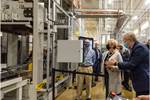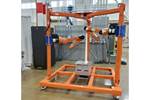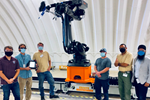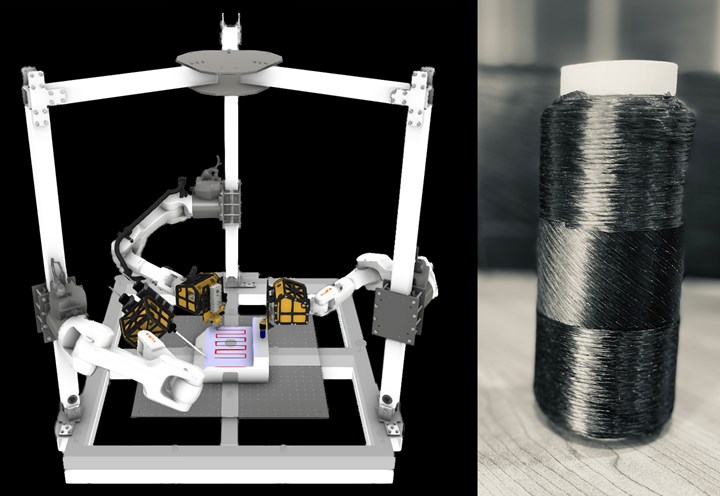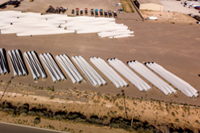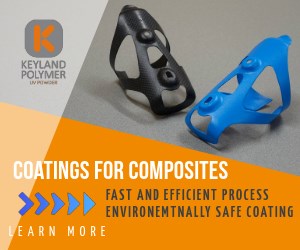Orbital Composites installs robotic AM system at University of Rhode Island
The 12-axis Orbital S system designed to print continuous fiber-reinforced parts will be used to advance research in composites for underwater unmanned vehicles.
The Orbital S multi-robot AM system and 3D printed continuous fiber-reinforced composite tubular part. Photo Credit: Orbital Composites
Orbital Composites (Campbell, Calif., U.S.) announces installation of its groundbreaking robotic additive manufacturing (AM) system at the University of Rhode Island (URI, Kingston). Reportedly the first of its kind, the 12-axis Orbital S multi-robot system will be used by URI to push the state-of-the-art in research relating to manufacturing of advanced composites for unmanned underwater vehicles (UUVs).
Orbital S is a multi-robot 3D printing system that seamlessly integrates Orbital’s expertise in collaborative robotics, machine learning and composite material expertise. One of the system’s most remarkable features is said to be the ability to print continuous fiber-reinforced parts with extreme tow steering, endowing them with high strength, durability and lightweight characteristics. This disruptive technology opens up a vast array of possibilities across industries including space, defense and energy.
Funded by the Office of Naval Research (ONR), URI’s research in underwater vessels makes them an ideal user of the Orbital S robotic AM platform. URI aims to reshape advanced manufacturing for next-generation underwater and surface vessels for the U.S. Navy and commercial applications.
“By partnering with universities, we are bridging the gap between academia and industry, fostering a dynamic environment where knowledge and applications intersect.”
"At URI, we are developing structural systems that withstand extreme environments with aggressive loading conditions, such as undersea pressures, shock and impact,” says Dr. Helio Matos, assistant professor of mechanical, industrial and systems engineering at URI. “Fiber-reinforced composite structures can be tailored to such conditions, and 3D printing such structures brings about a level of performance tailoring that has never existed before. We are using the Orbital 3D printing system to explore this research space and advance the development of future high-performance structural systems."
“Our robotic AM platform is redefining what is possible in composites manufacturing,” says Amolak Badesha, cofounder and CEO of Orbital Composites. “By empowering URI researchers and students with this transformative technology, we are driving design innovation while simultaneously training the next-generation workforce to excel in the digital manufacturing revolution.”
“By partnering with universities, we are bridging the gap between academia and industry, fostering a dynamic environment where knowledge and applications intersect,” adds Cole Nielsen, founder and CTO of Orbital Composites. “We are excited to shape the future of underwater vessels with URI, while equipping students with the skills and expertise necessary to succeed in the evolving landscape of digital composites manufacturing.”
Orbital Composites says it is pushing the boundaries of composites 3D printing technology and forging collaborations with leading academic institutions to foster innovation and propel progress in the manufacturing industry. Its partnership with URI represents a significant leap forward in advancing the capabilities of composites manufacturing and promises to deliver transformative outcomes. The company has validated its technology via demonstration projects with the U.S. Department of Defense (DOD) and the U.S. Department of Energy (DOE).
Related Content
-
US Air Force selects Integris Composites ballistic body armor
Cratus Wave armor is thin, lightweight and reduces heat stress, providing buoyant personal protection for the 582nd Helicopter Group.
-
Plant tour: Renegade Materials Corp., Miamisburg, Ohio, U.S.
Renegade Materials is known for high-performance prepregs for aerospace applications. Following its acquisition by Teijin in 2019, the company has expanded capacity and R&D efforts on a range of aerospace-targeted materials.
-
From the CW Archives: Airbus A400M cargo door
The inaugural CW From the Archives revisits Sara Black’s 2007 story on out-of-autoclave infusion used to fabricate the massive composite upper cargo door for the Airbus A400M military airlifter.


